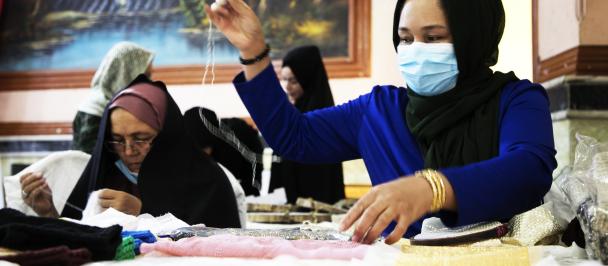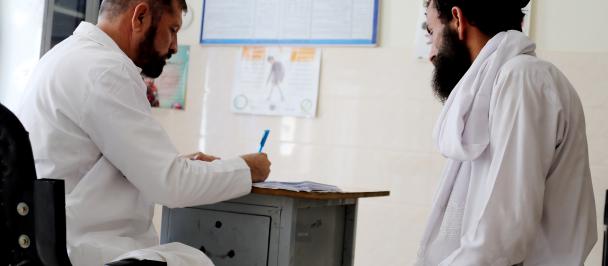Grants and training have helped businesses to take off, but accessible financing, loans, and guarantees can let them soar.

In Jibrail, a lively neighborhood on the outskirts of Herat, Afghanistan, the hum of sewing machines and the vibrant colors of fabrics weave a narrative of resilience and opportunity. A refuge for populations displaced by past conflict and intensifying climate challenges, Jibrail has seen its population fluctuate between 60,000 and 80,000, as families navigate continuous cycles of fleeing and returning due to violence, catastrophic droughts or neighboring countries’ adverse practices towards Afghan refugees and migrants. The influx of internally displaced persons (IDPs) in the past and returnees more recently has strained local resources and increased competition for jobs and basic needs. Social inclusion of returnees is essential, with entrepreneurship and job creation as key strategies for integration.

Boman, a former returnee from Iran, exemplifies the entrepreneurial spirit that can thrive here with effective international support. Boman embarked on his entrepreneurial journey in 2021 with a modest $2,200 grant from UNHCR. After an initial foray into crafting sofas and cushions, he followed market demand and pivoted into women's clothing and coats. This adaptability not only sustained his business through challenging times, but also paved the way for an expansion into men's clothing.
In October 2022, Boman's business reached a transformative milestone with a $3,530 grant from UNDP, supplemented by his $300 contribution. This enabled him to acquire essential machinery, including six sewing machines and an industrial ironing table, to expand operations. Two years later, with a workforce now numbering 150, Boman's products are sold through a local storefront in Jibrael, with a marketing agent helping to extend their reach to regional stores.
Despite these successes, Boman faces significant challenges in obtaining finance and securing space for expansion. Why? "Market, market, market," he says. Accessible, affordable financing needed to expand access to markets remains a significant hurdle, complicated by bureaucratic obstacles and stringent guarantee requirements that many small enterprises cannot meet. As a result, he relies on intermediaries, who capture a significant cut of the income generated from the value chain.
Boman's experience highlights the broader issues Afghan entrepreneurs face in securing loans. In addition to contending with guarantees that often exceed the loan amounts, business owners must navigate complex regulatory requirements mandating separate workspaces for women and men, requiring additional resources and investments in infrastructure.
Boman wants to keep providing job opportunities to women – he sees it as a good business decision that creates opportunities. “Two daughters of my father-in-law work here,” he adds with a grin. But his cramped workspace affords limited capacity for expansion or for separate facilities for women and men.
UNDP and its UN partners have been working to foster resilience and reintegration for returnees and internally displaced persons endeavoring to put durable solutions in place. In this region UNDP and UNHCR have supported over 70 small and medium-sized enterprises (SMEs) like Boman's, creating more than 1,400 jobs and assisting informal, women-led businesses while implementing community infrastructure projects to boost local resilience.
MSMEs are vital engines of economic stability and recovery. But sustaining their momentum requires additional financing mechanisms as entrepreneurs like Boman approach the limits of their growth potential. Afghanistan is the least banked nation in the world, with banking accounting for only 4% of its GDP. The country's financial exclusion rates are alarming: only 10% of men and a mere 5% of women hold bank accounts or have any formal access to financial systems. The lack of a domestic debt market and external borrowing options severely constrain financial support for businesses. In such an environment the informal sector dominates, with 90% of companies operating outside the formal economy.

In a context of immense basic human needs, revitalizing Afghanistan’s financial system is crucial to enhance capital access for businesses and households. For a modest loan of 15,000 AFG (approximately USD 220), Boman needs a guarantee of 80,000 AFG (approximately USD 1,175) —a daunting task for any Afghan, particularly a returnee.
UNDP takes a graduated approach to financial instruments, tailoring actions based on the distinct needs and objectives of different groups: grants for income-generating activities, loans for micro and small enterprises and for larger businesses. UNDP is exploring various innovative, Sharia-compliant tools for affordable loans to businesses, a loan guarantee program and matching grants to loans to facilitate the issuance of loans by Financial Service Providers (FSPs), and ROSCAs (Rotating Saving and Credit Associations), made up of women.
The loan guarantee program, for instance, has allocated one million USD to support loans worth $3.1 million, aiming to help approximately 400 MSMEs by 2027. With more funding, businesses like Boman's could benefit.
Although grants are essential, they must be managed judiciously to avoid undermining the development of sustainable loan and credit systems. Grants are primarily used to provide technical assistance, training, and enhance production chains to ensure more value remains with the entrepreneur—before affordable financing options are introduced.
With initial funding from its core resources, together with funding from Japan, the EU, and the private sector, UNDP is expanding these initiatives to create accessible and affordable financing mechanisms. However, the current available funding is insufficient for a country teeming with entrepreneurs like Boman, who are eager for opportunity after decades of conflict and very few job and income opportunities. His story illustrates that with the right support and financing, even the most vulnerable can forge a brighter future. Afghanistan's entrepreneurs deserve continued investment, as well as the tools and opportunities to prosper.

 Locations
Locations



